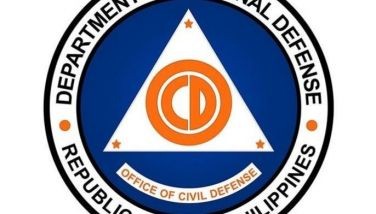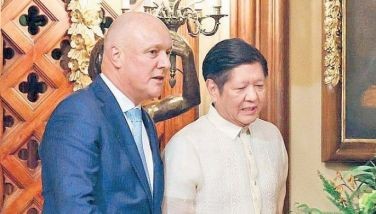Ex-chief justice Corona, 67
MANILA, Philippines - He was one of the nation’s top lawyers, capping his career with an appointment as chief justice, but fell ignominiously, becoming the first chief magistrate to be removed by impeachment.
Renato Corona died early yesterday due to cardiac arrest. He was 67.
His son Francis announced that the former Supreme Court (SC) chief died at 1:48 a.m. in The Medical City in Pasig where he was brought last Wednesday after suffering a heart attack.
“Please pray for the eternal repose of his soul as he joins his Creator,” the family said in a brief statement, adding that Corona’s remains will lie in state at The Heritage Park in Taguig City with viewing starting today.
Flags are flying at half-mast for Corona at the SC and all courts.
He died with the cases against him for graft and tax evasion still not resolved. A civil forfeiture case will proceed against his estate.
Malacañang expressed its condolences to the Corona family. “We join them in fervent prayers for his eternal repose,” Presidential Communications Operations Office Secretary Herminio Coloma Jr. said yesterday.
Vice President Jejomar Binay was saddened with Corona’s passing.
“It’s saddening. Two months ago, we were together at a dinner. But he already looked weak,” Binay said in an interview yesterday during a break in the campaign.
Chief Justice Maria Lourdes Sereno ordered that flags in the high
court and all courts nationwide be flown at half-mast to mourn the passing of the former chief justice whom she succeeded.
“The Chief Justice and the associate justices of the Supreme Court mourn the passing of Renato Corona, the Court’s 23rd chief justice. The Philippine flags in all courts and the Supreme Court colors will be flown at half staff starting today,” the SC said in a statement.
Corona, an alumnus of the Ateneo de Manila University from grade
school to law school, also had a Masters of Law degree from Harvard University. He served in the executive branch during the administration of former presidents Fidel Ramos and Gloria
Macapagal-Arroyo.
He was assistant secretary for legal affairs and later on presidential counsel of Ramos, before serving as chief-of-staff and acting executive secretary of Arroyo.
Corona then served in the judiciary for almost 10 years, before Arroyo appointed him as SC associate justice in April 2002.
Arroyo then named Corona chief justice of the high court in May 2010 – an appointment that became controversial because it fell within the 2010 election period covered by a ban on midnight appointments. The SC, however, ruled that appointments in its posts are not covered by such ban.
It was under Corona’s watch when the high tribunal in November 2011 ordered the distribution of the 4,915.75-hectare Hacienda Luisita in Tarlac to over 6,000 farmer workers-beneficiaries of the sugar estate owned by President Aquino’s family.
In his separate opinion on that case, Corona pushed for lower compensation for the hacienda owners based on the fair market value of the land in November 1989.
A month later, allies of the President in the House of Representatives voted to impeach Corona over charges of hidden assets and partiality to Arroyo.
After the impeachment trial – the first in judicial history – the Senate voted 20-3 in May 2012 to convict him for betrayal of public trust for his failure to disclose all his properties in his statement of assets, liabilities and net worth (SALN). He was then removed from office and was replaced by Senior Associate Justice Antonio Carpio in an acting capacity. After an extensive search for the next chief justice, including televised interviews with the Judicial and Bar Council, the President picked Sereno.
Corona’s ordeal under the Aquino administration did not stop with his impeachment. In March 2014, the Department of Justice (DOJ) filed a case against him before the Court of Tax Appeals (CTA) for allegedly evading taxes on P120.5 million in assets.
A few weeks after, the Office of the Ombudsman filed a civil case for forfeiture of unexplained wealth amounting to P130.3 million and also cases of perjury and violation of Republic Act 6713 (Code of Conduct and Ethical Standards for Public Officials) against him before the Sandiganbayan.
Amid all the cases, Corona vowed to clear his name and answer the
charges that he believed were part of a “merciless persecution” by the Aquino administration against supposed remnants of the Arroyo government.
He said he expected the filing of cases against him, citing the roles of Ombudsman Conchita Carpio-Morales and then justice secretary Leila de Lima – both appointees of Aquino – as prosecution witnesses in his impeachment trial.
Arroyo, now a Pampanga congresswoman, cited Corona for his dedication to the rule of law and unblemished public service record.
“With heartfelt prayers and sympathy, my family and I convey our deepest condolences to the family of chief justice Renato Corona on his passing. His unblemished record of service to the Republic, the rule of law and legal education deserves the praise and emulation of every Filipino and every advocate of truth and justice,” Arroyo said in a statement.
One of the last decisions of the Corona-led Supreme Court was allowing Arroyo – who was then being prosecuted for electoral sabotage – to seek treatment abroad for her degenerative bone disease afflicting her cervical spine.
Victim of ‘selective justice’
Vice Presidential aspirant Sen. Ferdinand Marcos Jr. mourned Corona’s death, saying that that he was a victim of Aquino’s brand of selective justice.
“It is always sad to note the passing of a man like chief justice Renato Corona to whom a great injustice was visited,” the senator told reporters during a press briefing in Daet, Camarines Norte.
Marcos, who voted against Corona’s impeachment, said it is unfortunate that at the time of his death Corona’s name was still under a cloud.
“I hope that his passing will finally bring him peace from the troubles of the day-to-day work,” Marcos said.
“My family and I extend our deepest condolences to his wife Cecille, their children and the rest of his family,” he added.
Three of Corona’s lawyers during his impeachment trial also expressed sadness over his death.
Rico Quicho, now the campaign spokesman for United Nationalist Alliance (UNA) standard-bearer Vice President Jejomar Binay, described Corona as “a good man, loving husband and father.”
Quicho said Corona “fought a good fight to uphold the independence of the institution he dearly loved.”
“His moral courage is second to none,” he said.
Quicho also thanked Corona for the trust he gave him “during his challenging times.”
“I will continue to fight for the rule of law and judicial independence,” he said.
Lawyer Karen Jimeno, who served as one of Corona’s spokespersons, shared similar sentiments. She said the former chief justice embodied what it meant to fight for the independence of a separate branch of government.
“The easy way out for him was to resign,” Jimeno said in a phone interview with The STAR. “But he decided to fight back.”
The lawyer said she kept in touch with Corona and his family even after the trial, referring to him as “a good friend.”
Describing the former chief justice as a family man, Jimeno said the impeachment trial took a toll on his health, considering that he was already suffering from diabetes.
“We saw his deterioration,” she said, noting that the stress did not stop as various criminal cases were filed against him even after the impeachment trial.
Jimeno said Corona respected the Senate’s decision to remove him from his post. He also declined to call for a mistrial even after allegations surfaced that senators had received funds from the Disbursement Acceleration Program in exchange for a vote to convict him.
Jimeno said what happened to Corona should always remind the public of the detrimental effects of trial by publicity. She stressed the need to follow the rule of law.
Former spokesman Tranquil Salvador also said that Corona “was a kind and gentle person who believed and stood for the rule of law.”
Criminal charges died with Corona
The criminal charges filed against Corona before the Sandiganbayan and the CTA have been extinguished following his death, Rommel Bagares, senior associate at the Roque and Butuyan Law Office, said.
However, he said the separate civil action for forfeiture filed against Corona could proceed against his estate.
Explaining the rules, lawyer Raymond Fortun said the criminal liability of an accused is personal to him.
“The death of the accused means that the penalty could no longer be enforced,” he said.
“Civil cases, on the other hand, can continue because the properties of the deceased belong to his estate upon his death. The plaintiffs can continue to pursue their claims by mere substitution of the estate of the decedent as a defendant,” added Fortun.
The former chief justice was facing graft and corruption and multiple counts of tax evasion cases before the Sandiganbayan and the CTA, respectively.
An independent P130-million civil forfeiture case was also filed against him before the anti-graft court.
Bagares said Corona’s lawyers would officially inform the respective courts of his death through a manifestation. – With Christina Mendez, Delon Porcalla, Perseus Echeminada, Helen Flores, Michael Punongbayan, Paolo Romero, Janvic Mateo
- Latest
- Trending


























